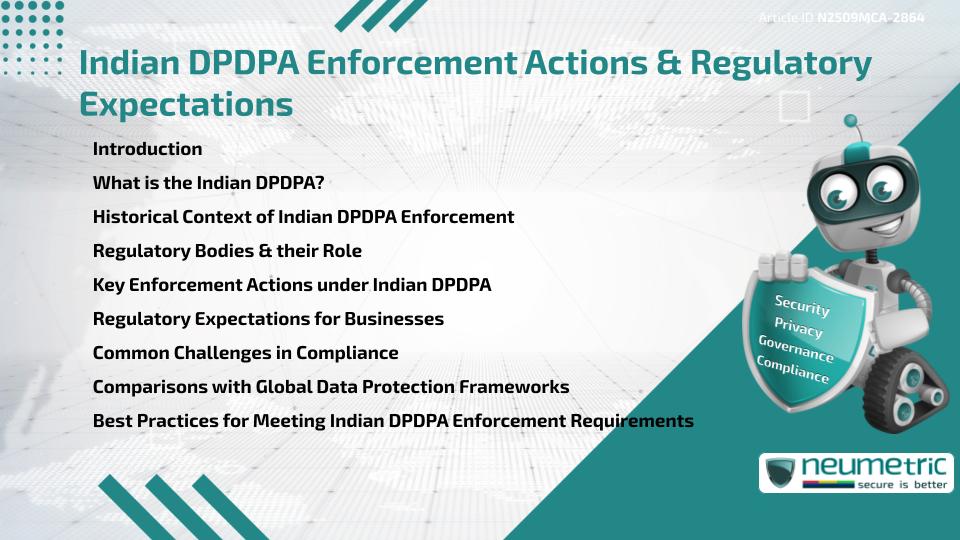Table of Contents
ToggleIntroduction
Indian DPDPA enforcement is a critical development shaping how Organisations handle Personal Data in India. The Digital Personal Data Protection Act [DPDPA] sets obligations for Businesses, Government bodies & Intermediaries to secure Personal Information & respect Privacy rights. Enforcement actions under this Framework highlight penalties for non-compliance, while Regulatory expectations provide clear guidance for businesses to align with Legal Standards. This article explores the Indian DPDPA, its enforcement history, key regulatory expectations, common challenges & Best Practices for effective compliance.
What is the Indian DPDPA?
The Indian Digital Personal Data Protection Act [DPDPA] is a law enacted to safeguard Personal Data of individuals. It establishes Principles of Consent, Purpose limitation, Data Minimisation & Accountability. The law applies to both Indian & foreign entities processing the Personal Data of Indian residents. Indian DPDPA enforcement ensures that Organisations take these obligations seriously, with Regulators authorised to investigate violations & impose penalties.
Historical Context of Indian DPDPA Enforcement
The push for a Data Protection Framework in India began after the landmark Supreme Court judgment in 2017 that recognised Privacy as a fundamental right. This led to the drafting & eventual passage of the DPDPA in 2023. Indian DPDPA enforcement gained momentum as Regulators prepared Frameworks for monitoring Compliance, much like how the European Union’s GDPR influenced its global enforcement ecosystem.
Regulatory Bodies & their Role
The primary regulatory body overseeing Indian DPDPA enforcement is the Data Protection Board of India. Its responsibilities include:
- Investigating complaints of non-compliance
- Conducting inquiries into Data Breaches
- Issuing penalties for violations
- Providing guidance to businesses on Compliance expectations
The Board acts as both watchdog & guide, ensuring that Organisations strike a balance between Innovation & Data Privacy.
Key Enforcement Actions under Indian DPDPA
Enforcement actions typically involve:
- Penalties for failing to obtain valid Consent
- Sanctions for inadequate Data Security Measures
- Notices to Organisations that fail to report Breaches
- Corrective directions for misuse of Personal Data
These actions serve as reminders to businesses that Compliance is not optional. Indian DPDPA enforcement emphasises Accountability & proactive Data Protection measures.
Regulatory Expectations for Businesses
Regulators expect businesses to:
- Obtain clear, informed & verifiable Consent from Individuals
- Maintain Transparency about data usage
- Implement adequate technical & organisational safeguards
- Appoint Data Protection Officers where required
- Report Data Breaches promptly
- Establish Grievance Redressal mechanisms for Users
Meeting these expectations not only avoids penalties but also strengthens Customer Trust.
Common Challenges in Compliance
Organisations often face challenges such as:
- High costs of Compliance for smaller firms
- Ambiguity in interpreting certain provisions
- Limited technical expertise in Data Security
- Resistance to cultural & operational changes
Indian DPDPA enforcement recognises these challenges but emphasises the importance of Compliance to protect individual rights.
Comparisons with Global Data Protection Frameworks
The Indian DPDPA shares similarities with the European Union’s GDPR & Brazil’s LGPD, particularly in areas of Consent & Accountability. However, enforcement mechanisms differ. For example, GDPR allows for cross-border enforcement, while Indian DPDPA enforcement is primarily jurisdictional. Understanding these differences helps multinational businesses adapt Compliance strategies across regions.
Best Practices for Meeting Indian DPDPA Enforcement Requirements
Businesses can prepare for Indian DPDPA enforcement by:
- Conducting regular Data Audits
- Training staff on Privacy obligations
- Implementing strong Data Security Measures
- Documenting Consent Management processes
- Engaging Legal & Compliance experts for guidance
Conclusion
Indian DPDPA enforcement actions highlight the seriousness of Data Protection in India. Organisations must align with Regulatory expectations to Safeguard data, avoid Penalties & build User Trust. While challenges exist, Best Practices & proactive Compliance strategies help businesses thrive under the new Regulatory Framework.
Takeaways
- Indian DPDPA enforcement ensures Accountability in Data Protection.
- Regulatory expectations include Consent, Transparency & Safeguards.
- Enforcement actions involve Penalties, Sanctions & Corrective steps.
- Businesses face Compliance challenges but can overcome them with planning.
- Proactive compliance strengthens Trust & reduces Legal Risks.
FAQ
What is Indian DPDPA enforcement?
It refers to actions taken by Regulators to ensure Compliance with the Digital Personal Data Protection Act in India.
Who oversees Indian DPDPA enforcement?
The Data Protection Board of India is the primary Regulatory body responsible for enforcement.
What penalties can businesses face under Indian DPDPA enforcement?
Penalties can include significant fines, sanctions & corrective directives for non-compliance.
Is Indian DPDPA enforcement applicable to foreign companies?
Yes, if foreign companies process Personal Data of Indian residents, they are subject to enforcement.
What are regulators’ key expectations under Indian DPDPA enforcement?
They expect valid consent, Data Security Measures, Transparency & timely reporting of Breaches.
How does Indian DPDPA enforcement compare with GDPR?
Both emphasise Consent & Accountability, but enforcement mechanisms differ, with GDPR enabling cross-border enforcement.
How can businesses prepare for Indian DPDPA enforcement?
Businesses should conduct Audits, Train staff, implement Safeguards & maintain clear Compliance documentation.
Need help for Security, Privacy, Governance & VAPT?
Neumetric provides organisations the necessary help to achieve their Cybersecurity, Compliance, Governance, Privacy, Certifications & Pentesting needs.
Organisations & Businesses, specifically those which provide SaaS & AI Solutions in the Fintech, BFSI & other regulated sectors, usually need a Cybersecurity Partner for meeting & maintaining the ongoing Security & Privacy needs & requirements of their Enterprise Clients & Privacy conscious Customers.
SOC 2, ISO 27001, ISO 42001, NIST, HIPAA, HECVAT, EU GDPR are some of the Frameworks that are served by Fusion – a SaaS, multimodular, multitenant, centralised, automated, Cybersecurity & Compliance Management system.
Neumetric also provides Expert Services for technical security which covers VAPT for Web Applications, APIs, iOS & Android Mobile Apps, Security Testing for AWS & other Cloud Environments & Cloud Infrastructure & other similar scopes.
Reach out to us by Email or filling out the Contact Form…





